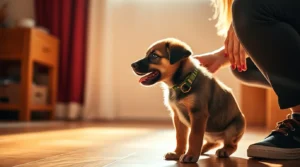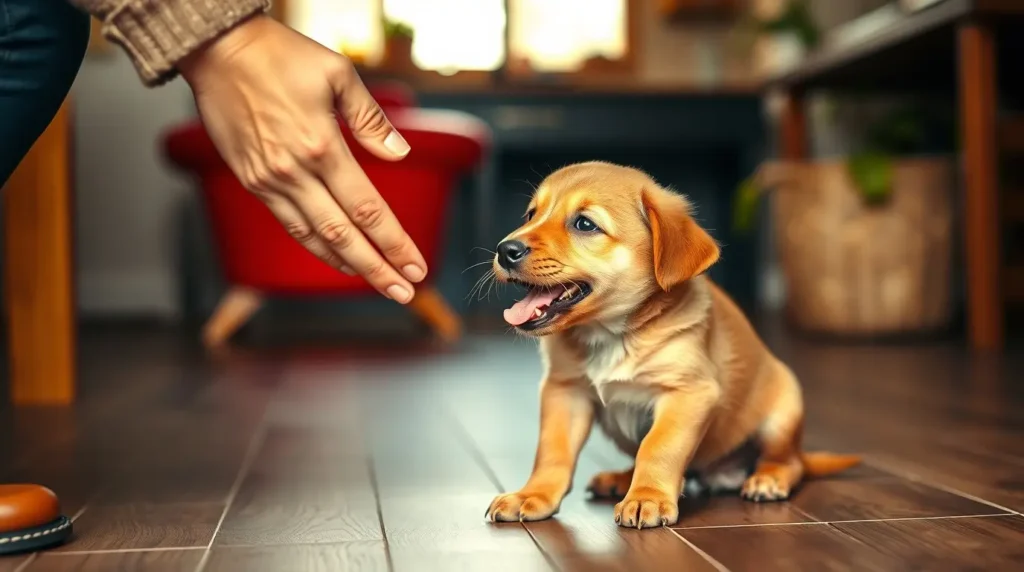Introduction: Whizpet’s Research on Puppy Excited Pee
At Whizpet, we understand how frustrating it can be when your puppy has accidents due to excitement. That’s why our team conducted extensive research to bring you the most effective solutions for puppy excited pee. Through expert insights, real-life case studies, and proven training methods, we’ve compiled this comprehensive guide to help pet parents manage and eventually stop this common issue.
Puppy excited pee is a natural behavior that occurs when young dogs get overly stimulated during greetings, playtime, or meeting new people. This often results from an underdeveloped bladder and nervous system, making it difficult for puppies to control their urination in high-energy situations. While many puppies grow out of this behavior with age, proper training and techniques can significantly speed up the process.
At Whizpet, we prioritize research-backed, compassionate training methods to help you and your furry friend succeed. This blog will walk you through the reasons behind puppy excited pee and the best ways to prevent it, ensuring a cleaner home and a happier puppy. Let’s get started on helping your pup develop better bladder control! In this guide, we’ll explore five easy and proven tips to help you stop your puppy’s excited peeing.
Why Does My Puppy Pee When Excited?
Before diving into solutions, it’s essential to understand why puppy excited pee happens. Puppies have underdeveloped bladder control, and their emotions can trigger involuntary urination. This is common in young dogs, especially between 8 weeks and 6 months old. Some reasons include:
- Immature bladder: Puppies haven’t yet developed full control over their bladder muscles.
- Submissive behavior: Some dogs exhibit submissive urination, a natural response to excitement or perceived authority.
- High energy levels: Excitement can cause a lack of focus on bodily functions, leading to accidental leaks.
- Certain dog breeds: Some breeds, like Cocker Spaniels and Golden Retrievers, are more prone to excitement urination.
Now that we know the causes, let’s move on to effective ways to stop puppy excited pee.

1. Stay Calm and Greet Your Puppy Gently
One of the biggest triggers of puppy excited pee is overstimulation during greetings. When you return home, your puppy may jump, wag its tail excessively, and urinate due to excitement.
What to Do:
- Keep your greetings low-key and avoid overly enthusiastic interactions.
- Ignore your puppy for a few minutes after entering the house, then greet them calmly.
- Encourage others in your household to follow the same approach.
What to Avoid:
- High-pitched voices or excessive petting upon arrival.
- Making direct eye contact or standing over your puppy, as this can feel intimidating.
2. Train Your Puppy with Positive Reinforcement
Training your puppy to manage emotions and bladder control is essential. Using positive reinforcement can help shape desirable behaviors.
Training Tips:
- Reward your puppy with treats and praise when they stay calm in exciting situations.
- Use commands like “sit” or “stay” to shift their attention.
- Gradually expose them to stimulating situations in a controlled manner.
Example: If your puppy leaks urine when meeting guests, ask visitors to ignore them initially. Once your puppy calms down, they can receive gentle attention and rewards.
3. Establish a Consistent Potty Schedule
A structured potty routine can help reduce instances of puppy excited pee. If your puppy knows when and where to relieve itself, accidents will decrease.
How to Set a Schedule:
- Take your puppy outside frequently, especially before playtime or meeting new people.
- Reward successful potty breaks to reinforce good behavior.
- Monitor signs of pre-pee behavior (sniffing, circling) and respond promptly.
Recommended Potty Breaks:
- First thing in the morning
- After meals and naps
- Before bedtime
- After play sessions or exciting interactions
4. Use Crate Training to Build Bladder Control
If your puppy struggles with puppy excited pee in a crate, it might be due to nervousness or excess energy. Proper crate training can provide security and improve bladder control.
Crate Training Tips:
- Choose a properly sized crate—not too big, not too small.
- Ensure the crate is a safe and comforting space, not a punishment zone.
- Take your puppy out to potty immediately after releasing them from the crate.
- Avoid prolonged crating—puppies need frequent breaks!
5. Address Submissive Urination Behavior
If your puppy pees when they see a specific person or when being reprimanded, it might be submissive urination, a sign of insecurity rather than excitement.
How to Handle It:
- Avoid scolding—punishment can make submissive urination worse.
- Encourage confidence-building activities, such as obedience training.
- Let your puppy meet new people at their own comfort level.
If submissive urination continues past 6-7 months of age, consult a veterinarian to rule out medical issues.

FAQs About Puppy Excited Pee
1. When Will My Puppy Stop Peeing When Excited?
Most puppies outgrow excitement urination between 6-12 months as their bladder control improves.Regular training can accelerate this process.
2. Is Excited Peeing More Common in Female Puppies?
Yes, female puppies are more prone to excitement urination, but it can happen to males too. Proper training helps both genders overcome this issue.
3. Why Does My Puppy Pee When It Sees a Certain Person?
This could be due to submissive urination or a strong emotional response. Encourage gentle interactions to help your puppy feel secure.
4. Can a Medical Condition Cause Excitement Peeing?
Yes, while excitement urination is normal in puppies, urinary tract infections (UTIs) or incontinence could be underlying causes.If the issue continues, seek advice from a veterinarian.
5. How Can I Clean Up Puppy Pee Effectively?
Use an enzymatic cleaner to remove urine odors and prevent repeat accidents.Avoid cleaners containing ammonia, as they may resemble the scent of urine.
Final Thoughts: Be Patient and Consistent!
Stopping puppy excited pee takes patience, consistency, and the right training techniques. Remember:
- Stay calm and use positive reinforcement.
- Follow a structured potty schedule.
- Encourage confidence-building activities.
- Seek professional help if the issue persists.
By following these five proven tips, your puppy will develop better bladder control and confidence over time. Stay patient, and soon, you’ll enjoy a cleaner, happier home with your well-trained pup!
Need More Puppy Training Help?
If you found this guide helpful, share it with fellow pet parents! Have specific questions? Drop a comment below—we’d love to help!
Related blog: For more detailed information about pet care

